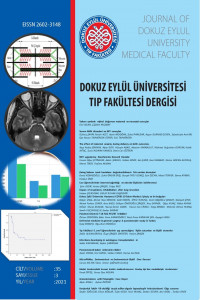Öz
This study investigated the effects of defensive medicine on the practice of physicians in general surgery
Methods: A questionnaire consisting of 30 questions titled “Defensive Medicine in General Surgery” was administered to 229 physicians in general surgery by e-mail. The responses were evaluated by univariate and multivariate analyses.
Results: All variables with a statistically significant effect on defensive medicine during univariate analysis were included as candidate factors in multivariate linear regression analysis of defensive medicine. The tendency to adopt defensive medicine practices decreased significantly with an increasing total number of operations performed annually. With increasing degree of regret about working as a general surgeon and increasing scores concerning predictive attitude knowledge-based factors, the tendency to adopt defensive medicine practices also increased significantly. There were no significant correlations between other demographic characteristics and the tendency to adopt defensive medicine practices.
Conclusion: Detailed studies on determinant factors identified in this study may aid in resolving problems concerning defensive medicine.
Keywords: defensive medicine, general surgery, Turkey
Anahtar Kelimeler
Kaynakça
- Reed DA, Windish DM, Levine RB, Kravet SJ, Wolfe L, et al. Do fears of malpractice litigation influence teaching behaviors? Teach Learn Med 2008;20(3):205–211.
- 17. Goyert GL, Bottoms SF, Treadwell MC, Nehra PC. The physician factor in cesarean birth rates. N Engl J Med 1989;320:706–709.
- 18. Jena AB, Seabury S, Lakdawalla D, Chandra A. Malpractice risk according to physician specialty. N Engl J Med 2011;365(7): 629–636.
- 19. Michota FA, Donnelly MJ. Medicolegal issues in perioperative medicine: Lessons from real patients. Cleve Clin J Med 2009;76(4): S119–S125.
- 20. Anderson RE. Billions for defense: The pervasive nature of defensive medicine. Arch Intern Med 1999;159: 2399–2402.
- 21. Eddy DM. Performance measurement: Problems and solutions. Health Affairs (Millwood) 1998;17: 7–25.
- 22. Weisman CS, Teitelbaum MA, Morlock LL. Malpractice claims experience associated with fertility control services among young obstetrician-gynecologists. Med Care 1988;26: 298–306.
- 23. Sclar DI, Housman MG. Medical Malpractice and physician liability: Examining alternatives to defensive medicine. HHPR 2003;4(1):75–84.
Öz
This study investigated the effects of defensive medicine on the practice of physicians in general surgery
Methods: A questionnaire consisting of 30 questions titled “Defensive Medicine in General Surgery” was administered to 229 physicians in general surgery by e-mail. The responses were evaluated by univariate and multivariate analyses.
Results: All variables with a statistically significant effect on defensive medicine during univariate analysis were included as candidate factors in multivariate linear regression analysis of defensive medicine. The tendency to adopt defensive medicine practices decreased significantly with an increasing total number of operations performed annually. With increasing degree of regret about working as a general surgeon and increasing scores concerning predictive attitude knowledge-based factors, the tendency to adopt defensive medicine practices also increased significantly. There were no significant correlations between other demographic characteristics and the tendency to adopt defensive medicine practices.
Conclusion: Detailed studies on determinant factors identified in this study may aid in resolving problems concerning defensive medicine.
Keywords: defensive medicine, general surgery, Turkey
Anahtar Kelimeler
Kaynakça
- Reed DA, Windish DM, Levine RB, Kravet SJ, Wolfe L, et al. Do fears of malpractice litigation influence teaching behaviors? Teach Learn Med 2008;20(3):205–211.
- 17. Goyert GL, Bottoms SF, Treadwell MC, Nehra PC. The physician factor in cesarean birth rates. N Engl J Med 1989;320:706–709.
- 18. Jena AB, Seabury S, Lakdawalla D, Chandra A. Malpractice risk according to physician specialty. N Engl J Med 2011;365(7): 629–636.
- 19. Michota FA, Donnelly MJ. Medicolegal issues in perioperative medicine: Lessons from real patients. Cleve Clin J Med 2009;76(4): S119–S125.
- 20. Anderson RE. Billions for defense: The pervasive nature of defensive medicine. Arch Intern Med 1999;159: 2399–2402.
- 21. Eddy DM. Performance measurement: Problems and solutions. Health Affairs (Millwood) 1998;17: 7–25.
- 22. Weisman CS, Teitelbaum MA, Morlock LL. Malpractice claims experience associated with fertility control services among young obstetrician-gynecologists. Med Care 1988;26: 298–306.
- 23. Sclar DI, Housman MG. Medical Malpractice and physician liability: Examining alternatives to defensive medicine. HHPR 2003;4(1):75–84.
Ayrıntılar
| Birincil Dil | İngilizce |
|---|---|
| Konular | Cerrahi, Sağlık Kurumları Yönetimi |
| Bölüm | Araştırma Makaleleri |
| Yazarlar | |
| Yayımlanma Tarihi | 30 Aralık 2021 |
| Gönderilme Tarihi | 5 Ekim 2021 |
| Yayımlandığı Sayı | Yıl 2021 Cilt: 35 Sayı: 3 |


